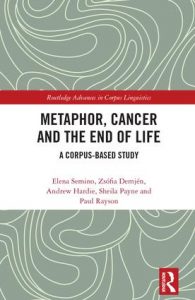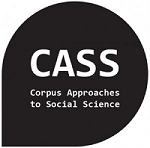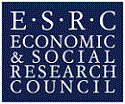
Metaphor in End-of-Life Care
(Originally on the European Association for Palliative Care blog on 29 November 2012)
by Zsófia Demjén
On 1 September, academics from three faculties at Lancaster University began the data collection stage of the ESRC (Economic and Social Research Council) funded project ‘Metaphor in End-of-Life Care’. Over 18 months, Elena Semino, Veronika Koller, Andrew Hardie and Zsófia Demjén (Linguistics and English Language), Paul Rayson (Computing and Communications) and Sheila Payne (International Observatory on End of Life Care) will study the metaphors used by patients, unpaid family carers and healthcare professionals in a 1.5-million-word data set consisting of interviews and contributions to online fora.
The study focuses on metaphors as these are often used in describing complex, emotional, subjective and taboo experiences – they can convey more, more vividly, but very concisely. Any systematic patterns can shed light on the nature of the experiences, attitudes, and needs of the members of each group and identify areas where increased anxiety or misunderstanding can occur.
For example, though it’s early days yet, we noticed that death is talked about in at least two ways: it is seen as something that approaches the patient, and also as something that the patient moves towards. When I suggested this to one of our interviewees after the interview, he immediately responded with: “Of course there’s a difference! If I’m hit by a bus then death has approached me.” Brilliantly put. And the types of questions we’ll be asking ourselves are ‘Is one way of describing it more common in one group than another (eg patients compared to healthcare professionals)?’ ‘Could this be problematic when they are trying to have difficult but necessary conversations?’
We’ll employ more traditional qualitative analysis of language use, but will also take advantage of Wmatrix, innovative semi-automated text analysis software developed by Paul Rayson. Wmatrix includes a module that can group individual words into categories of meaning. For example, expressions such as able-bodied, bedridden, freshen, recuperate, well, health-wise, blood clot, breast cancer, etc would all be grouped under ‘Health and Disease’. We can explore categories of meaning that are likely to be used metaphorically in context and identify examples in the entire data set without having to search for every possible word individually. This will allow us to identify metaphorical expressions more systematically than is currently possible, not only manually, but also with the help of other semi-automated tools.
In the coming months, after the completion of interviews, we will begin more intensive and extensive analyses leading to various publications and conference presentations. We intend to keep our website updated with developments, preliminary results and observations. We hope that in the process we will help make a tangible difference in the final stages of individuals’ lives.





